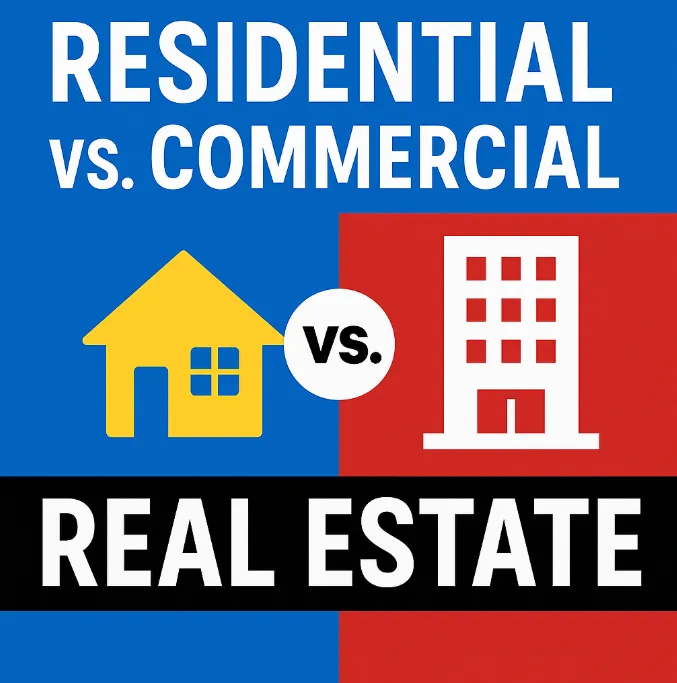
🏢 Residential vs. Commercial Real Estate: What Investors Must Know 🏠
🏢 Residential vs. Commercial Real Estate: What Investors Must Know 🏠
📊 Key Differences Between Residential & Commercial Real Estate Explained 🔍
🧠 Key Differences: Residential vs. Commercial Real Estate
When stepping into the world of property investing, one of the biggest decisions you'll face is whether to invest in residential or commercial real estate. Both sectors offer unique advantages—but also come with specific challenges. Understanding the key differences between residential and commercial real estate is critical for long-term success, whether you're a new investor or a seasoned business owner seeking expansion.
🔑 1. Purpose and Property Types
Residential real estate refers to properties intended for people to live in. These include single-family homes, townhomes, condos, and small multifamily buildings (typically up to four units).
Commercial real estate (CRE), on the other hand, includes properties used for business purposes. Examples include office buildings, retail centers, warehouses, industrial facilities, hotels, and multifamily properties with five or more units.
💰 2. Income Potential and ROI
Commercial properties generally offer higher returns on investment (ROI) than residential properties due to longer leases and higher rental rates per square foot. However, they may also come with increased vacancy risks and upfront capital requirements.
Residential investments often have more stable occupancy rates but may offer lower yields. They're easier to finance and manage for first-time investors.
🤝 3. Lease Structure
Residential leases are typically short—12 months being the norm. In contrast, commercial leases can range from 3 to 10 years (or longer), often with built-in rent escalations, triple net (NNN) clauses, or percentage rent options. This creates more predictable cash flow for the commercial property owner.
🏦 4. Financing
Residential real estate financing relies heavily on borrower income, credit score, and debt-to-income ratio. Programs like FHA, VA, or conventional loans are commonly used.
Commercial real estate loans, however, are largely based on the property’s income and performance. Lenders assess the Debt Service Coverage Ratio (DSCR), rent rolls, and pro formas rather than personal tax returns. Loans are often made to LLCs or corporations instead of individuals.
📋 5. Management Intensity
Managing a commercial property usually requires more oversight, professional property management, and specialized maintenance. This can be offset by the triple net lease structures where tenants handle many expenses.
Residential properties may be easier to manage yourself but come with more frequent tenant turnover and maintenance calls.
🧠 Final Thoughts
Understanding the core differences between residential and commercial real estate empowers investors to build better strategies. Residential may be right for ease and entry, but commercial offers scale, stability, and long-term wealth-building potential.
Whether you're looking to expand your investment portfolio or shift from residential to commercial real estate, having a knowledgeable advisor and lender by your side is key.
https://www.houstonrealestatebrokerage.com/
https://www.houstonrealestatebrokerage.com/houston-cre-navigator
https://www.commercialexchange.com/agent/653bf5593e3a3e1dcec275a6
http://expressoffers.com/[email protected]
https://app.bullpenre.com/profile/1742476177701x437444415125976000
https://author.billrapponline.com/
https://www.amazon.com/dp/B0F32Z5BH2
© 2023-2024 Bill Rapp, Broker Associate, eXp Commercial Viking Enterprise Team
